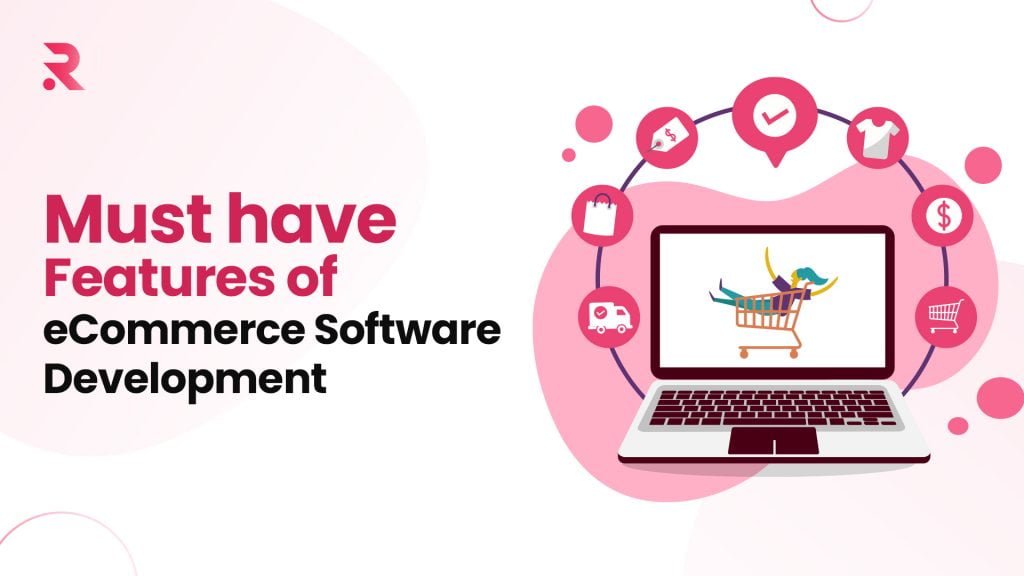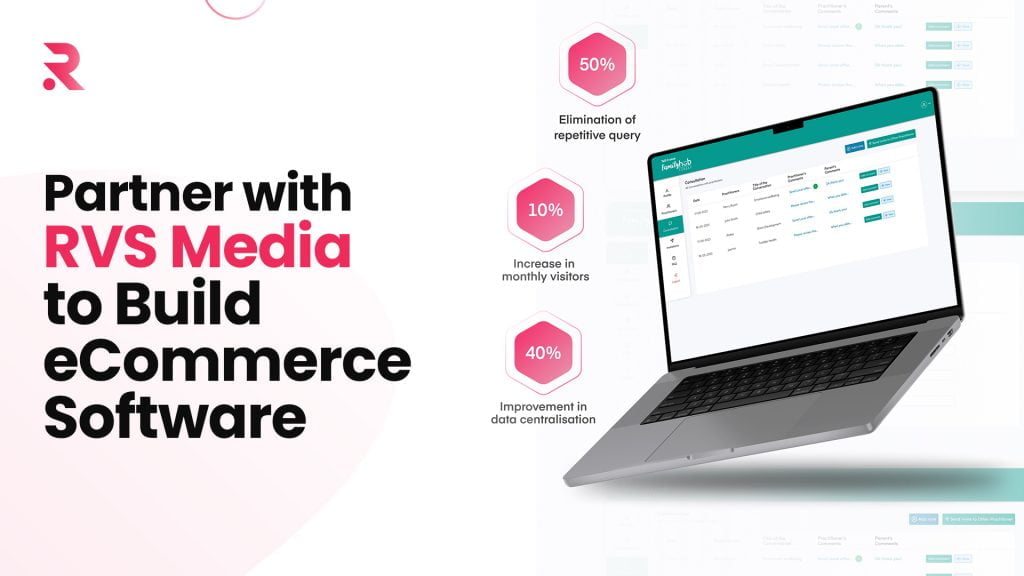Choosing the Right Ecommerce Software Development Agency: A Comprehensive Guide- 2024
- Jan 11, 2024
- By Tanisha Sharma

In today’s fast-changing online world, picking the perfect team to build your online store is like finding the best architect for your dream house. Think about the thrill of seeing your online sales skyrocket in just a few months or giving your customers an experience, they’ll rave about.
That’s the magic a top-notch eCommerce development team can make happen. Join us as we explore the ins and outs of eCommerce software development in 2024, making it easy for anyone to understand how to select the best eCommerce development agency for your business.
What is eCommerce Software Development?
eCommerce software development is the powerhouse fuelling online businesses. In other words, it’s the backstage maestro orchestrating the show that is your online store. Imagine it as the tech-savvy brain behind platforms like Amazon and Alibaba. While you see a seamless shopping experience, it’s the intricate software!
This software isn’t just about displaying products; it’s a wizard that reads your preferences, processes payments in a blink, and tailors recommendations to fit your taste. Ever searched for shoes and suddenly seen shoe ads everywhere? That’s the software, making your shopping journey smoother.
It’s the magic sauce enabling businesses to adapt, personalize, and optimize their online stores for a stellar customer experience. Essentially, eCommerce software development transforms a basic website into a thriving marketplace where users connect, shop, and businesses thrive.
What are the Uses of Ecommerce Software?
Ecommerce software is a versatile tool that revolutionizes how businesses interact with customers and expand their reach. Its applications go beyond just facilitating online sales; it’s the driving force behind numerous aspects of a thriving digital business. Let’s delve into its multifaceted uses:
- Seamless Customer Experiences: It allows businesses to tailor interactions, recommend products based on browsing history, and simplify the checkout process, enhancing customer satisfaction.
- Global Market Reach: One of its most remarkable powers lies in breaking geographical barriers. eCommerce software empowers businesses, like small artisanal jewellery stores, to transcend local boundaries and reach global audiences.
- Enhanced Marketing Strategies: Through sophisticated data analysis and customer insights, eCommerce software aids in creating targeted marketing campaigns. It enables businesses to understand consumer behavior, preferences, and trends, allowing for more effective and personalized marketing strategies.
- Optimized Inventory Management: Efficient inventory management is crucial in the success of any business. Ecommerce software streamlines inventory tracking, ensuring products are adequately stocked and readily available, thereby preventing stockouts and optimizing supply chain operations.
- Integration of Multiple Sales Channels: With the right software, businesses can seamlessly integrate various sales channels like websites, social media, and marketplaces into a unified platform. This integration ensures consistent branding, easier management, and broader customer accessibility.
5 Must-Have Features of eCommerce Software Development

When it comes to crafting a successful online platform, the features embedded in eCommerce software play a pivotal role. These elements aren’t just checkboxes; they are the gears that drive exceptional user experiences and bolster business growth.
Let’s explore these essential eight features:
- Intuitive User Interfaces: Think of the user interface as the storefront window of your online shop—it’s the first impression. Intuitive interfaces simplify navigation, making it effortless for customers to explore products, find what they need, and make purchases without getting lost in a maze of options.
- Secure Payment Gateways: Security is non-negotiable in today’s digital landscape. Secure payment gateways ensure that customers’ financial information remains protected during transactions. Integrating trusted payment gateways instills confidence in users, encouraging more transactions and fostering trust in your brand.
- Adaptable Design: An adaptable design is like a chameleon—it adjusts to any device or screen size seamlessly. Whether customers are browsing on a smartphone, tablet, or desktop, the website’s design remains visually appealing and functional, providing a consistent experience across all devices.
- Robust Inventory Management: An efficient inventory management system is the backbone of a successful eCommerce platform. It ensures accurate tracking of products, manages stock levels, and prevents overselling or stockouts, thereby optimizing operations and customer satisfaction.
- Personalization Capabilities: Personalization is the secret sauce that enhances customer engagement. Features that tailor recommendations based on past purchases or browsing history create a more personalized shopping experience, boosting customer loyalty and retention.
How Does Software Works for eCommerce Businesses?
Imagine a Swiss Army knife tailored specifically for online businesses—that’s the power of bespoke eCommerce software suites like Shopify or WooCommerce. These sophisticated systems are more than just platforms; they’re the unsung heroes running behind the scenes, orchestrating every aspect of a thriving online store.
- Streamlined Inventory Management
At the core of successful business operations lies an efficient inventory management system. eCommerce software seamlessly tracks products, updates stock levels in real-time, and ensures that the right products are available when customers need them. This prevents stock shortages and overstocking, optimizing supply chain efficiency. - Efficient Payment Processing
When it comes to facilitating transactions, eCommerce software is the smooth operator. It handles payments swiftly and securely, integrating with various payment gateways to offer customers multiple options. This seamless payment process encourages more sales while ensuring the safety of sensitive financial information. - Personalized Shopping Experiences
Ever felt like an online store knew exactly what you were looking for? That’s the magic of eCommerce software. It analyzes customer behavior and preferences to curate personalized recommendations, making the shopping experience feel tailor-made for each visitor. This personal touch enhances customer satisfaction and encourages repeat purchases. - Scalability and Flexibility
Successful businesses grow, and eCommerce software grows along with them. These platforms are designed to be scalable and adaptable, allowing businesses to add new features, expand their product lines, and cater to increasing customer demands without compromising on performance. - Centralized Data Management
Data is the gold mine for businesses, and eCommerce software serves as the vault. It centralizes and organizes crucial data, from customer information to sales metrics. This data becomes the foundation for informed decision-making, enabling businesses to strategize effectively and stay ahead of the curve.
What is an Ecommerce Software Development Company?

Imagine eCommerce software development company as the visionary architects and enchanting wizards of the digital realm, weaving magic to transform businesses’ online presence. These specialized firms aren’t just tech-savvy; they’re master craftsmen tailoring bespoke solutions for each business. They eschew the one-size-fits-all approach, meticulously assessing a business’s aspirations, audience, and needs to craft unique online platforms that resonate.
Much like seasoned coaches, custom website development company optimize these platforms, employing expert tactics to ensure faster load times, higher search rankings, and increased customer conversions. In the rapid currents of the digital landscape, these agencies serve as experienced navigators, steering businesses through trends, tools, and strategies, paving the way for success in the bustling online marketplace.
Their forte lies in curating user experiences akin to stepping into a perfectly arranged store—intuitive, engaging, and unforgettable. Equipped as problem solvers, they untangle intricate tech challenges, integrating systems seamlessly and ensuring flawless transactions. Beyond mere service providers, they become long-term partners, offering ongoing support, strategic guidance, and maintenance, ensuring platforms evolve and thrive.
Ultimately, these agencies act as catalysts for business growth, empowering businesses to expand their horizons, boost sales, and establish impactful online identities that resonate deeply with their audience.
How to choose an eCommerce development company?
- Assess Your Needs: Begin by understanding your business requirements and goals. Look for a company that listens to your ideas, understands your vision, and tailors solutions that align with what you aim to achieve online.
- Check Their Portfolio: Take a peek at their past work. Look for diversity in their portfolio—do they have experience in creating different types of online stores? This gives you an idea of their capabilities and whether they’ve handled projects similar to yours.
- Reviews and Testimonials: What are people saying? Check out reviews and testimonials from their previous clients. This helps gauge their reputation, reliability, and the satisfaction level of their clients. It’s like getting a reference before trying a new restaurant!
- Expertise and Support: Make sure they offer the right expertise and support. Are they up-to-date with the latest trends and technologies? Do they provide ongoing support after your website goes live? You want a team that’s knowledgeable and there for you in the long run.
- Cost and Timeline: Discuss costs and timelines upfront. Ensure there are no hidden costs and that the timeline matches your expectations. It’s like agreeing on the price and delivery date before ordering something online—it avoids surprises later on.
Remember, choosing an eCommerce website agency London is like finding a reliable partner for your online journey. Consider their understanding of your needs, their track record, what others say about them, their expertise, and how transparent they are about costs and timelines. It’s all about finding a team that not only builds your online store but also supports your growth along the way.
How Much Does Ecommerce Software Development Cost?
The price tag for creating eCommerce software varies, a bit like buying different types of phones—some have more features and cost more. The cost depends on a few things: how complex you want your online store to be, the special features you need (like a fancy search bar or personalized recommendations), and if you want it to grow easily as your business does. Think of it as picking a car—more features mean a higher price.
The way your online store looks and how easy it is to use also affects the cost. Like decorating a house, a simple design costs less than a fancy, eye-catching one. Plus, if you want your store to work smoothly with other things, like your accounting software, that can bump up the cost, a bit like getting all your gadgets to work together.
Don’t forget about ongoing support! Like a warranty for your phone, having people help with updates and fixing things after your online store is set up adds to the cost. Knowing these things helps plan your budget—it’s about finding a balance between what you need and what you can afford for your online store.
Partner with RVS Media to Build Exceptional Ecommerce Software

When it comes to transforming businesses in the digital arena, RVS Media stands as a beacon of innovation and reliability. We aren’t just a b2b eCommerce development agency; we’re architects of digital success stories. Our journey is marked by a legacy of empowering businesses through tailor-made eCommerce solutions that resonate with uniqueness and efficiency.
- Proven Track Record: Our success stories aren’t mere tales; they’re verifiable triumphs etched in the growth graphs of businesses we’ve partnered with. From niche startups to established enterprises, our solutions have consistently propelled their online presence to unprecedented heights. We’re not just about creating websites; we’re about sculpting digital empires.
- Custom-Tailored Solutions: At RVS Media, one size does not fit all. We understand that each business is distinctive, with its own aspirations and challenges. That’s why we craft solutions specifically for you—precisely tailored to suit your business needs, amplifying your strengths, and transforming your vision into a captivating online reality.
- Expertise and Innovation: Innovation is the cornerstone of our ethos. Our team comprises tech enthusiasts and creative wizards who breathe life into ideas. We don’t just follow trends; we set them. With our finger on the pulse of the latest technologies and market trends, we infuse innovation into every line of code and pixel of design.
Conclusion,
Choosing the right eCommerce agency is pivotal for your online journey. At RVS Media, we’re more than just experts—we’re partners committed to transforming your vision into a thriving online reality. Let’s embark on this journey together, crafting your online success story hand in hand. Reach out, and let’s make your eCommerce aspirations a captivating digital reality!
 Shopify
Shopify




















